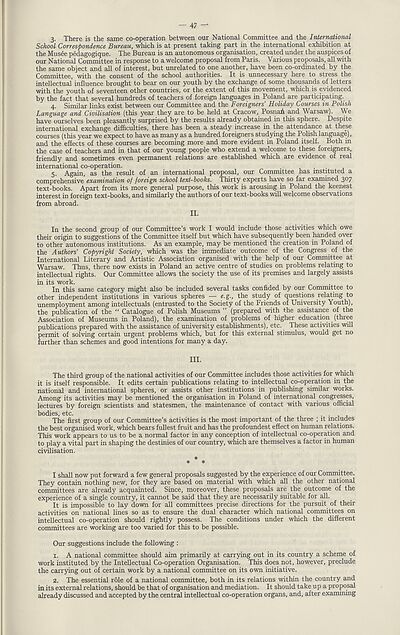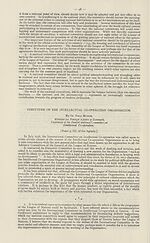International > Proceedings of the second General conference of national committees on intellectual co-operation, Paris, July 5th-9th, 1937
(49)
Download files
Complete book:
Individual page:
Thumbnail gallery: Grid view | List view

— 47 —
3. There is the same co-operation between our National Committee and the International
School Correspondence Bureau, which is at present taking part in the international exhibition at
the Musee pedagogique. The Bureau is an autonomous organisation, created under the auspices of
our National Committee in response to a welcome proposal from Paris. Various proposals, all with
the same object and all of interest, but unrelated to one another, have been co-ordinated by the
Committee, with the consent of the school authorities. It is unnecessary here to stress the
intellectual influence brought to bear on our youth by the exchange of some thousands of letters
with the youth of seventeen other countries, or the extent of this movement, which is evidenced
by the fact that several hundreds of teachers of foreign languages in Poland are participating.
4. Similar links exist between our Committee and the Foreigners’ Holiday Courses in Polish
Language and Civilisation (this year they are to be held at Cracow, Posnah a.nd Warsaw). We
have ourselves been pleasantly surprised by the results already obtained in this sphere. Despite
international exchange difficulties, there has been a steady increase in the attendance at these
courses (this year we expect to have as many as a hundred foreigners studying the Polish language),
and the effects of these courses are becoming more and more evident in Poland itself. Both in
the case of teachers and in that of our young people who extend a welcome to these foreigners,
friendly and sometimes even permanent relations are established which are evidence of real
international co-operation. . . .
5. Again, as the result of an international proposal, our Committee has instituted a
comprehensive examination of foreign school text-books. Thirty experts have so far examined 3^7
text-books. Apart from its more general purpose, this work is arousing in Poland the keenest
interest in foreign text-books, and similarly the authors of our text-books will welcome observations
from abroad.
II.
In the second group of our Committee’s work I would include those activities which owe
their origin to suggestions of the Committee itself but which have subsequently been handed over
to other autonomous institutions. As an example, may be mentioned the creation in Poland of
the Authors’ Copyright Society, which was the immediate outcome of the Congress of the
International Literary and Artistic Association organised with the help of our Committee at
Warsaw. Thus, there now exists in Poland an active centre of studies on problems relating to
intellectual rights. Our Committee allows the society the use of its premises and largely assists
in its work.
In this same category might also be included several tasks confided by our Committee to
other independent institutions in various spheres — e.g., the study of questions relating to
unemployment among intellectuals (entrusted to the Society of the Friends of University Youth),
the publication of the “ Catalogue of Polish Museums ” (prepared with the assistance of the
Association of Museums in Poland), the examination of problems of higher education (three
publications prepared with the assistance of university establishments), etc. These activities will
permit of solving certain urgent problems which, but for this external stimulus, would get no
further than schemes and good intentions for many a day.
III.
The third group of the national activities of our Committee includes those activities for which
it is itself responsible. It edits certain publications relating to intellectual co-operation in the
national and international spheres, or assists other institutions in publishing similar works.
Among its activities may be mentioned the organisation in Poland of international congresses,
lectures by foreign scientists and statesmen, the maintenance of contact with various official
bodies, etc. . .
The first group of our Committee’s activities is the most important of the three ; it includes
the best organised work, which bears fullest fruit and has the profoundest effect on human relations.
This work appears to us to be a normal factor in any conception of intellectual co-operation and
to play a vital part in shaping the destinies of our country, which are themselves a factor in human
civilisation.
*
* *
I shall now put forward a few general proposals suggested by the experience of our Committee.
They contain nothing new, for they are based on material with which all the other national
committees are already acquainted. Since, moreover, these proposals are the outcome of the
experience of a single country, it cannot be said that they are necessarily suitable for all.
It is impossible to lay down for all committees precise directions for the pursuit of their
activities on national lines so as to ensure the dual character which national committees on
intellectual co-operation should rightly possess. The conditions under which the different
committees are working are too varied for this to be possible.
Our suggestions include the following :
1. A national committee should aim primarily at carrying out in its country a scheme of
work instituted by the Intellectual Co-operation Organisation. This does not, however, preclude
the carrying out of certain work by a national committee on its own initiative.
2. The essential role of a national committee, both in its relations within the country and
in its external relations, should be that of organisation and mediation. It should take up a proposal
already discussed and accepted by the central intellectual co-operation organs, and, after examining
3. There is the same co-operation between our National Committee and the International
School Correspondence Bureau, which is at present taking part in the international exhibition at
the Musee pedagogique. The Bureau is an autonomous organisation, created under the auspices of
our National Committee in response to a welcome proposal from Paris. Various proposals, all with
the same object and all of interest, but unrelated to one another, have been co-ordinated by the
Committee, with the consent of the school authorities. It is unnecessary here to stress the
intellectual influence brought to bear on our youth by the exchange of some thousands of letters
with the youth of seventeen other countries, or the extent of this movement, which is evidenced
by the fact that several hundreds of teachers of foreign languages in Poland are participating.
4. Similar links exist between our Committee and the Foreigners’ Holiday Courses in Polish
Language and Civilisation (this year they are to be held at Cracow, Posnah a.nd Warsaw). We
have ourselves been pleasantly surprised by the results already obtained in this sphere. Despite
international exchange difficulties, there has been a steady increase in the attendance at these
courses (this year we expect to have as many as a hundred foreigners studying the Polish language),
and the effects of these courses are becoming more and more evident in Poland itself. Both in
the case of teachers and in that of our young people who extend a welcome to these foreigners,
friendly and sometimes even permanent relations are established which are evidence of real
international co-operation. . . .
5. Again, as the result of an international proposal, our Committee has instituted a
comprehensive examination of foreign school text-books. Thirty experts have so far examined 3^7
text-books. Apart from its more general purpose, this work is arousing in Poland the keenest
interest in foreign text-books, and similarly the authors of our text-books will welcome observations
from abroad.
II.
In the second group of our Committee’s work I would include those activities which owe
their origin to suggestions of the Committee itself but which have subsequently been handed over
to other autonomous institutions. As an example, may be mentioned the creation in Poland of
the Authors’ Copyright Society, which was the immediate outcome of the Congress of the
International Literary and Artistic Association organised with the help of our Committee at
Warsaw. Thus, there now exists in Poland an active centre of studies on problems relating to
intellectual rights. Our Committee allows the society the use of its premises and largely assists
in its work.
In this same category might also be included several tasks confided by our Committee to
other independent institutions in various spheres — e.g., the study of questions relating to
unemployment among intellectuals (entrusted to the Society of the Friends of University Youth),
the publication of the “ Catalogue of Polish Museums ” (prepared with the assistance of the
Association of Museums in Poland), the examination of problems of higher education (three
publications prepared with the assistance of university establishments), etc. These activities will
permit of solving certain urgent problems which, but for this external stimulus, would get no
further than schemes and good intentions for many a day.
III.
The third group of the national activities of our Committee includes those activities for which
it is itself responsible. It edits certain publications relating to intellectual co-operation in the
national and international spheres, or assists other institutions in publishing similar works.
Among its activities may be mentioned the organisation in Poland of international congresses,
lectures by foreign scientists and statesmen, the maintenance of contact with various official
bodies, etc. . .
The first group of our Committee’s activities is the most important of the three ; it includes
the best organised work, which bears fullest fruit and has the profoundest effect on human relations.
This work appears to us to be a normal factor in any conception of intellectual co-operation and
to play a vital part in shaping the destinies of our country, which are themselves a factor in human
civilisation.
*
* *
I shall now put forward a few general proposals suggested by the experience of our Committee.
They contain nothing new, for they are based on material with which all the other national
committees are already acquainted. Since, moreover, these proposals are the outcome of the
experience of a single country, it cannot be said that they are necessarily suitable for all.
It is impossible to lay down for all committees precise directions for the pursuit of their
activities on national lines so as to ensure the dual character which national committees on
intellectual co-operation should rightly possess. The conditions under which the different
committees are working are too varied for this to be possible.
Our suggestions include the following :
1. A national committee should aim primarily at carrying out in its country a scheme of
work instituted by the Intellectual Co-operation Organisation. This does not, however, preclude
the carrying out of certain work by a national committee on its own initiative.
2. The essential role of a national committee, both in its relations within the country and
in its external relations, should be that of organisation and mediation. It should take up a proposal
already discussed and accepted by the central intellectual co-operation organs, and, after examining
Set display mode to:
![]() Universal Viewer |
Universal Viewer | ![]() Mirador |
Large image | Transcription
Mirador |
Large image | Transcription
Images and transcriptions on this page, including medium image downloads, may be used under the Creative Commons Attribution 4.0 International Licence unless otherwise stated. ![]()
| League of Nations > International > Proceedings of the second General conference of national committees on intellectual co-operation, Paris, July 5th-9th, 1937 > (49) |
|---|
| Permanent URL | https://digital.nls.uk/195217812 |
|---|
| Shelfmark | LN.XII |
|---|
| Description | Over 1,200 documents from the non-political organs of the League of Nations that dealt with health, disarmament, economic and financial matters for the duration of the League (1919-1945). Also online are statistical bulletins, essential facts, and an overview of the League by the first Secretary General, Sir Eric Drummond. These items are part of the Official Publications collection at the National Library of Scotland. |
|---|---|
| Additional NLS resources: |
|

